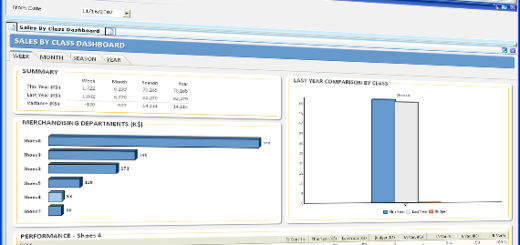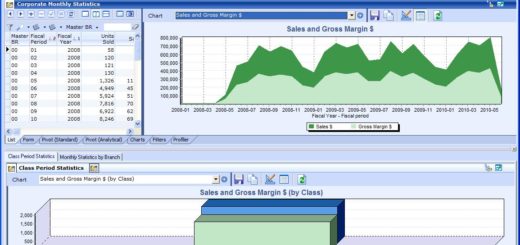Assurer le succès du commerce de détail : comment les solutions BI rationalisent la chaîne d’approvisionnement pour une efficacité optimale

In the ever-changing retail landscape, success depends on delivering products efficiently, meeting customer demands, and staying ahead of the competition. The key to achieving these goals lies in streamlining the supply chain for optimum efficiency. To unlock this potential, more and more retailers are turning to Business Intelligence (BI) solutions. These powerful tools offer actionable insights, data-driven decision-making, and improved supply chain visibility, leading to improved performance and increased profitability.
8 Ways BI Solutions Streamline the Retail Supply Chain for Optimal Efficiency
BI solutions offer retailers the opportunity to improve supply chain efficiency, reduce expenses and optimize operations by gaining valuable supply chain visibility. These solutions include
1. Understanding the Challenges
The retail supply chain is a complex network of interdependencies involving manufacturers, suppliers, distributors, and retailers. A multitude of factors, such as demand volatility, inventory management, logistics, and forecasting, can present significant challenges to supply chain efficiency. It is essential to identify these challenges and address them effectively to ensure sustainable growth and profitability.
2. The Role of Business Intelligence
Business Intelligence solutions enable retailers to harness the power of data and transform it into actionable insights. BI solutions provide a holistic view of the entire supply chain by consolidating data from multiple sources, such as point-of-sale systems, inventory management software, and customer relationship management tools. This comprehensive understanding allows retailers to make data-driven decisions, optimize processes, and identify opportunities for improvement.
3. Demand Forecasting
Accurate demand forecasting is an essential aspect of effective supply chain management. BI solutions leverage historical sales data, market trends, and other relevant factors to generate accurate demand forecasts. By understanding demand patterns and fluctuations, retailers can optimize stock levels, reduce out-of-stocks and minimize overstocking situations. In this way, they can strike the right balance between satisfying customer demands and controlling costs.
4. Accurate Inventory Tracking
BI solutions are vital in accurately tracking inventory throughout the supply chain. Retailers gain real-time visibility into inventory levels, location, and movement by integrating data from various sources, including warehouses, distribution centers, and retail stores. This information enables precise inventory management, reducing the risk of stockouts and overstocks. Accurate inventory tracking also enhances forecasting accuracy, allowing retailers to optimize replenishment cycles and improve overall supply chain efficiency.
5. Influence Fact-Based Analytical Models
BI solutions augment and influence fact-based analytical models based on consumer behavior. Retailers can understand the aspects that influence sales by analyzing customer data, such as purchase history and browsing patterns. This valuable insight allows retailers to tailor their marketing strategies, product assortments, and pricing strategies to align with customer preferences. By leveraging data-driven models, retailers can make informed decisions that lead to increased sales and customer satisfaction.
6. Targeted Assortment Planning Tools
BI solutions offer targeted assortment planning tools that enable retailers to optimize their product offerings. By analyzing market trends, customer preferences, and sales performance, retailers can identify high-demand products, identify gaps in their assortment, and make informed decisions regarding product selection and placement. This targeted approach helps retailers optimize shelf space, reduce waste, and drive sales through a well-curated product assortment.
7. Improved Stock Replenishment and Collaboration
BI solutions facilitate improved stock replenishment by providing real-time insights into inventory levels, sales data, and demand forecasts. Retailers can set up automated triggers and alerts to initiate timely reordering, ensuring optimal inventory levels and reducing the risk of stockouts. Moreover, BI solutions enhance collaboration with vendors and suppliers by providing visibility into inventory levels and demand forecasts. This collaboration enables efficient supplier management, reduced lead times, and improved overall supply chain performance.
8. Continuous Improvement and Adaptability
The retail industry constantly evolves, and retailers must stay agile and adaptable to succeed. BI solutions provide retailers with real-time analytics and key performance indicators (KPIs) that help track progress and measure the impact of process improvements. By identifying areas for optimization and implementing continuous improvement strategies, retailers can stay ahead of the competition and meet their customers’ changing needs and expectations.
Conclusion
In today’s competitive retail landscape, unlocking success requires a streamlined and efficient supply chain. Business Intelligence solutions empower retailers with data-driven insights, enhanced visibility, and improved collaboration, enabling them to optimize inventory management, streamline logistics operations, and deliver personalized customer experiences. By harnessing the power of BI, retailers can achieve optimal efficiency, drive profitability, and secure a competitive edge in the ever-evolving world of retail.
Leverage Retail Business Intelligence and Analytics with ChainDrive
ChainDrive can help retailers leverage the power of retail business intelligence (BI) and analytics to gain actionable insights, optimize operations, and drive profitability in their retail business. Experience the transformative impact of retail business intelligence by requesting a courtesy demo with our dedicated software specialists today. Explore the extensive features, functionalities, and how ChainDrive aligns precisely with your unique business requirements. Take the first step towards maximizing your retail success with data-driven decision-making.





